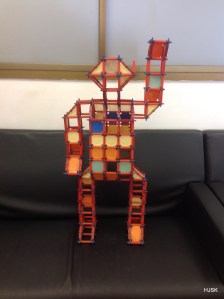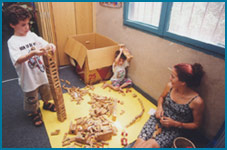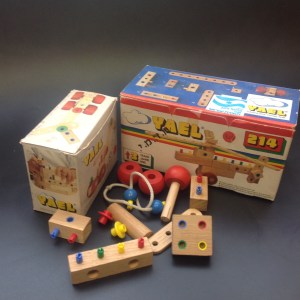Some of my best stories about changes in play during the time I have been observing playprojects involve playdough.
Pez Display
One of our displays, small, in keeping with our character of being a Heritage Centre of Play
Most of our Pez containers are vintage and are considered to be collectibles. The heads that are on the bottom of the display were decapitated some forty years ago and were used as finger puppets. According to the prices in an ‘’antique’’ shop on Sheinkin Street each of our figures are worth from 60 to 90 shekels. The market stall holder in Jaffa’s flea market just sniffed at me and wouldn’t answer when I asked for prices. She knew I was not a buyer.
This larger display is in the Museum of the Patent Office in Georgetown, Washington . I was there when it was quite new and bought lots of stuff in its shop before eating a delicious dinner at the Inaugural Banquet in its vast atrium.
Here I am at work after searching for Jefferson’s shoe boxes.
At the United States Patent Office, paper copies of patent documents are stored in special drawers called “shoes.” According to some, the term “shoes” arose from Thomas Jefferson’s practice of storing early patent documents in his shoe boxes.

We are Housebound
Which of us has not spent time in clearing some of our possessions?
In my case I have mused over boxes of my accumulation of toys.
Such memories.
I shall look for stuff that I prepared for this Website. That was before personal family happenings stopped my possibility to write. Now we are adapting (those of us who are able) to the caprices and vagaries of Carona Virus itself and the fumbling of politicians.
I shall begin.
IONA OPIE
This is from Playing the Archive.
Iona Opie’s work has inspired generations.
playing the archive
Fun ahead.
This is my call back to working on “Israel Play Heritage”
https://playingthearchive.wordpress.com/
YAEL building blocks
Heritage Centre? Museum of Play?
Heritage Centre? Museum of Play?
I have had on my mind how to describe our Heritage Centre of Play.
Which aspects does it share with a Museum of Play, if at all?
An established Museum of Play or of Toys and Games or of Childhood or such stuff should have no difficulty in arranging a pop-up display of toys of the last one hundred years.
I took as a measuring stick the illustrated article by Allie Townsend that appeared in TIME magazine on February 16th. 2011. You may see it here – http://content.time.com/time/specials/packages/0,28757,2049243,00.html
It covers the years from 1923 to 2011 and describes 100 toys and playthings which she claims to have been the most influential. She did not say “in U.S.A.” which she should have.The original toys are illustrated and are presented according to their year of production.
I list here the toys that we could put on show. There are some originals though most are derivatives (meaning they are the outcome of the influence engendered by those originals) and many have been produced in Israel. Lots have been “previously loved”.
Chemistry set
Yo-yo
Pop-up books
Stuffed Mickey Mouse
Finger paint
Microscope set
Beach Ball
Toy gun
Tiny plastic soldiers
Bubble solution
Little Golden Books
Slinky
Lego Building Blocks
Silly Putty
Fisher-Price Little People
Vinyl Colourforms
Paint by numbers
Mr. Potato Head
Matchbox Car
Pez Dispenser
Bendy Action Figure
Playdough
Frisbee
Push Toy on Stick
Hula Hoop
Barbie
Troll Doll
Toy Train
Etch A Sketch
Rocking Stacking Toy
Ken
Toy Telephone
Action Men
Audio Toy
Super Bouncy Ball
Barrel of Monkeys
Radio Controlled Car
Hot Wheels Model Cars
Playmobil
Foam Ball for Indoors
Weebles
Paddington Bear
Shrinky Dinks
Rubik’s Cube
Electronic toys
Cabbage Patch Doll
Polly Pocket
Care Bear
My Little Pony
Transformers
Plush Toys
Koosh Ball
Ninja Turtle
Skip It
Glow stick
Beanie Baby
Buzz Lightyear
Elmo
Furby
Magnet Toys
Bratz
A Modern Problem for a Modern Grandmother
A Modern Problem for a Modern Grandmother
3D Printers and I
I am very happy that in my lifetime 3D printers will become affordable and I shall be able to make toys and games together with my grandchildren in a corner of my kitchen. I have no garage. Maybe I should take over the small bedroom for this enterprise. We can look forward to molding sweets for parties and layering paper for board games and doll’s houses and making parts of construction sets and personalizing dolls and figures.
Might I become the enemy of the workers of the Toy Industry? I do not think so.
The Makers
Chris Anderson is part of the Maker Culture, people who make things and communicate how. In Chapter Five of his latest book ‘’Makers” is the delightfully told story of how he helped his daughters solve their desire to refurnish their doll’s house. What miniature furniture that they could buy was in no way suitable because it was the wrong scale, flimsily made or vastly expensive. He preferred, remembering previous experience with his children, not to get out his woodworking tools. However, he had a 3D printer and a computer in the house. With a few clicks they chose plans for the furniture and after some sloshing of the 3D printer the two girls had the perfect doll’s house furniture.
In his words ‘’If you are a toy company, this story should give you chills.’’
That depends, I say.
Threat to Toy Industry?
I do not think that a grandmother and her grandchildren making toys on her kitchen table shall pose a threat to an industry. What non-professionals can produce will be no competition for well made, cleverly contrived, colourful, interesting and fashionable manufactured toys. What it might lead to could be a decline in the toy market of the shoddy, the badly made and the potentially dangerous.
Ramifications
Look seriously at the ramifications of our relationship with this machine once it shall be in our homes. Where shall the materials be stored? (Not in the kitchen. Just the names of the stuff sound toxic). Who will regulate the safety of the materials and the product? From where will we get the plans of the toys and games that we shall want to make? Should they be free of charge or should they be tied to proprietary rights and licenses? Shall toy companies chase after their protection rights and tempt children to conspire and scorn the law?
Should not consent to the sharing of one’s ideas and not being coerced, respect and credit for another person’s innovations and efforts be in our creed?
What will be the rights of the grandmother, or grandchild, who designs new toys and sends them downstream on the www river of the net? Shall they ever get remuneration or credit? Should all this be regulated? Will the market do its work if we stand back and do nothing?
Our Expectations of Toy Manufacturers.
May we envisage that toy manufacturers shall give plans together with the toys they are selling so that children can make bits and pieces for themselves to enhance their play? Should we not be encouraging manufacturers to do this?
Not new questions. They have been asked, though not in my words, for the past few years. As yet there have been no answers that would help me.
Bears on the Ceiling
Bears on the Ceiling
Ceilings should play their part in displaying toys.
This is a hammock of Famous Bears that constituted a quiz during our Family Events one Summer.
Who held up an airplane?
One of these bears made a family miss the boat to Israel. Which one?
One bear looks very sad. Which one? His owner left him behind in a hospital.
Which is the oldest bear?
The bear on the left was made to commemorate what event?
How many bears remind you of Coco-Cola?
Who was designed to make money?
Which bear is the most travelled?
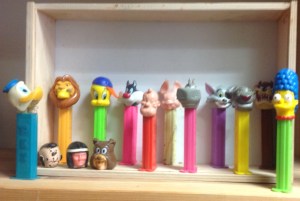
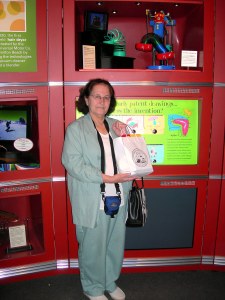

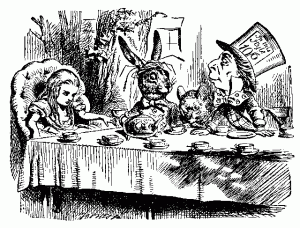 The tea party guests are wondering what to do next after Pesach and Easter. This year they are Homebound. How shall they play?
The tea party guests are wondering what to do next after Pesach and Easter. This year they are Homebound. How shall they play? 